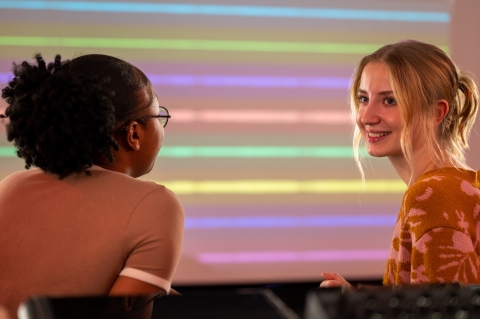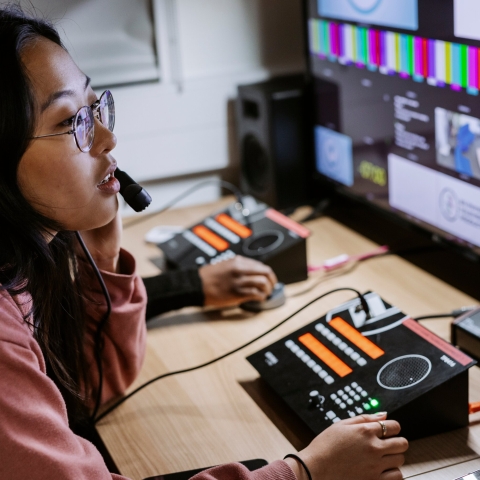
Competition for jobs in this sector is high and work experience could be the deciding factor in getting your foot in the door. Undertaking work experience is an invaluable way to develop expertise and gain practical skills, all of which will help you demonstrate, in your applications, your motivation and commitment to your chosen area of work. Securing experience will also help you gain a broad understanding of the industry as a whole and build your contact network, which is crucial in this industry. Remember to use social media when searching for opportunities, as last-minute runner jobs are often posted on social media pages. Ensure that you’re following employers of interest to you on social media in order to see when these vacancies are advertised.
Initially, your options for work experience may be voluntary, but as you build your skills and knowledge you will have more opportunity to take on paid positions. While taking unpaid work is fine when starting out in film, be wary of working for free for an extended period of time.
Read on below for more information about the types of opportunities that might be available, as well as advice on how to approach your search for work experience.
Types of opportunities
Internships (usually a fixed period or a limited amount of time), will give you a more hands-on experience. Many employers will treat internships in the same way as full-time employment, so when a job role asks for 'at least one year’s experience’ you can include this type of experience.
Placements will give you a long-term look at an organisation, and help you to build contacts and experience. On some degrees work placements are part of the programme, whilst on others you can choose to complete a placement as one of your modules. Many courses at the University of Portsmouth enable you to complete a one year work placement or self-employment placement. To learn more about completing a placement, you can contact the Placements team in the Careers and Employability Service.
Search for placements at:
Learn more about taking a placement
Many students from the Faculty of Creative and Cultural Arts choose to take a Self-Employed Placement. This allows you to work for yourself during your placement year and receive support from the University's Student Startup Team. You will have access to funding opportunities, networking events and workshops.
It is worth considering the voluntary sector for work experience - this could be a valuable way to build up your skills and knowledge in this field. Our Volunteering Bank provides local opportunities to undertake alongside your studies, listing roles such as:
-
Cinema Front of House Volunteer with Southsea Cinema and Arts Centre (Portsmouth Film Society)
-
Volunteer Event Videographer/Photographer with YMCA Fairthorne Group
Learn more about our Volunteering Team
You might also like to check out the Students' Union and discover what volunteering opportunities they have within their various media channels; see if they need presenters for the union radio or television stations. Victory Media provides high quality shows online and across the campus, find out if they are recruiting staff for forthcoming projects. Explore ccitv, is there a chance to get involved in any of their films? There could be a multitude of opportunities here for you to gain excellent experience.
Work experience weeks are a good way to get a short but intense feel for how a particular role works and are a helpful way to find out more about a job you think you’d like.
Work shadowing is an introduction to many areas of the media. Here you would be spending time with an experienced professional, learning about what they do and observing elements of their work.
Finding opportunities
Below you will find links to useful websites to help you locate potential work experience opportunities.
Speculative applications
You might find it tricky to find advertised opportunities within the film industry, so a speculative approach could be crucial for you to secure some work experience, which is where you approach employers yourself to enquire of any suitable opportunities.
They involve sending a CV and cover letter to an employer to ask if they can offer any work experience, even if the company is not currently advertising placements or internships.
Submitting a speculative application shows your interest in a specific company and your willingness to go above and beyond to develop your skills and understanding of the industry.
Directories that will help you locate companies to target as part of a speculative approach in the film industry include:
- Screen Global Production (formerly KFTV)
- Mandy Network
- The Knowledge
- 4RFV
Tips for finding work experience
- Attend events such as screenings and launches where you can network and make contacts.
- Be proactive and make direct contact with organisations or individuals who interest you and apply speculatively; send a targeted CV and a covering letter focused on why you are interested in them.
- Try to build up a blog or portfolio of work that you can present to potential employers. This will show that you are proactive and evidence practically what you can do.

Enable University alerts
Turn on notifications for critical updates like closures, safety alerts, and urgent service disruptions.









